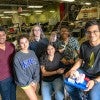
Two Rice faculty elected to American Academy of Arts and Sciences
Rice professors Pedro Alvarez and Antonios Mikos have been elected fellows of the American Academy of Arts and Sciences, one of the oldest learned societies in the nation.

Two Rice faculty elected to American Academy of Arts and Sciences
Rice professors Pedro Alvarez and Antonios Mikos have been elected fellows of the American Academy of Arts and Sciences, one of the oldest learned societies in the nation.

Faculty recognized with award for superior teaching
Nine Rice University faculty members received the 2024 George R. Brown Award for Superior Teaching, which honors top Rice instructors based on votes from alumni who graduated within the past two, three and five years.

Faculty, staff, students honored for excellence in teaching, mentoring, service
Each year, Rice honors members of the university community who have served students through outstanding teaching, dedication and service.

Rice bioengineers win $1.4M ARPA-H grant for osteoarthritis research
Bioengineers at Rice University have been awarded $1.4 million as part of a multi-center consortium funded by the Advanced Research Projects Agency for Health (ARPA-H) to develop strategies for reversing the effects of osteoarthritis.

Rice team demonstrates miniature brain stimulator in humans
Rice engineers have developed the smallest implantable brain stimulator demonstrated in a human patient that could revolutionize treatment for drug-resistant depression and other psychiatric or neurological disorders.

Rice engineering students’ device could make intubation safer for young babies
TinyTrach, a team of interdisciplinary engineering students from Rice, created an innovative pediatric endotracheal tube integrated with a camera and anchoring system that could make intubation procedures safer for babies 1 month and older by ensuring precise placement, stable anchoring and visibility access for up to 14 days.

Rice study identifies protein responsible for gas vesicle clustering in bacteria
Rice University bioengineers and colleagues at Washington University in Saint Louis and Duke University identified a protein nanostructure that plays a role in the cellular structure of certain microorganisms, paving the way to more efficient biotechnological and biomedical applications.

Rice’s bioengineering department celebrates 25-year anniversary
The Department of Bioengineering at Rice University celebrated its 25th anniversary March 22 with an event held at the Texas Medical Center Helix Park. Around 200 guests assembled to celebrate the department’s history and accomplishments.

A team of Rice researchers led by Angel Martí, professor and chair of chemistry and professor of bioengineering, materials science and nanoengineering, was awarded a $1.875 million grant by the National Institutes of Health to support its groundbreaking research in biological fibrillar nanostructures with potential implications for the treatment and diagnosis of diseases including Alzheimer’s and Parkinson’s.

Scale and systems: A view of the energy innovation pipeline at CERAWeek
Leaders, faculty and fellows from Rice University spoke at CERAWeek March 18-22 to share their expertise or research on a myriad of topics relating to the energy transition. In line with Rice’s multidisciplinary culture, the experts represented the fields of materials science, nanoengineering, electrochemical sciences, social sciences, innovation and geopolitics.

Rice group helps improve support device for end-stage heart failure
Rice’s Joseph Cavallaro and his team are part of two multi-institutional projects that have won grants from the Department of Defense (DOD) and the NIH, respectively, to develop and optimize new left ventricular assist devices (LVADs).

Rice energy, geopolitics, innovation experts to speak at CERAWeek
A number of experts in energy, carbon, hydrogen, sustainability, geopolitics and innovation from Rice University will appear at CERAWeek, an annual energy conference organized by the information and insights company S&P Global, to present their research or expertise March 18-22.

Rice engineer Jacob Robinson participated in the first “Houston Day: Beyond the Bayou” program organized by the Greater Houston Partnership, which brought together state legislators from across Texas for a two-day legislative advocacy event in Houston earlier this month.

Rice Biotech Launch Pad adds William McKeon to external advisory board
Rice University today announced the addition of William (Bill) McKeon to its external advisory board for the Rice Biotech Launch Pad, a Houston-based accelerator focused on expediting the translation of the university’s health and medical technology discoveries into cures.

Rice’s Naomi Halas awarded Optica’s C.E.K. Mees Medal
Rice University’s Naomi Halas has been selected as the 2024 recipient of the C.E.K. Mees Medal by Optica for her “original use of optics across multiple fields.”